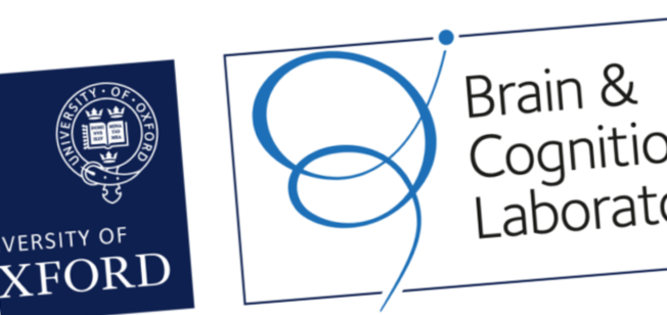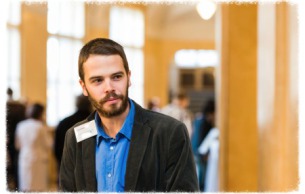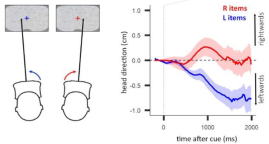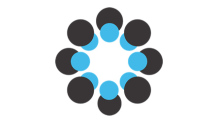
I lead the Adaptive Behaviour & Cognition Lab at the Department of Experimental Psychology in Oxford. Our work focuses on understanding the interactions between attention and memory. That includes understanding how attention is directed in memory and what the nature of this memory space is. But also, how memory representations are formed, modulated, and used in a predictive fashion when guiding behaviour. Our investigations focus on complex and naturalistic behaviour, using psychophysics, eye-tracking, EEG, and Virtual Reality.
I teach Cognitive Psychology and Statistical Theory & Experimental Methods for the Department for Experimental Psychology and Brasenose College. This includes lectures, tutorials, workshops, and practicals for B. Sc., M. Sc., and PhD students.
I am the Lead for Open Science at the Department for Experimental Psychology and part of the Open Neuroimaging Steering Group for the Wellcome Centre for Integrative Neuroimaging at the University of Oxford.
Pronouns: he/him
-updates-
Sensorimnemonic decisions: choosing memories versus sensory information
In a new Trends of Cognitive Sciences piece, we operationalise a fundamental psychological function that is central to many of our interactions in the environment – when to rely on memories versus sampling sensory information anew to guide behavior.
Long-term memory facilitates spontaneous memory usage through multiple pathways
Many everyday tasks require the use of memories from different timescales to guide our behaviour. Using a virtual reality task (https://doi.org/10.1016/j.cub.2025.01.045), we explore how we spontaneously engage long-term memory during free-flowing behavior—not because we have to, but because we choose to.
A blogpost by the Psychonomic Society on our recent consensus paper
BBC covered our collaboration with Kate Watkin's Brain, Speech, & Language Group
For anyone who missed our @BBCNews piece on stammering from yesterday here it is. It’s great to see all the research happening and I hope one day we’ll get some answers. Huge thanks to everyone we spoke to and top team of Sophie Tall & @realGHodson pic.twitter.com/RQCZFJ2oAc
— Felicity Baker (@Felicity_Baker) February 9, 2024
we are part of two large "Team Science" efforts and have reported some updates:
The Past, Present, and Future of the Brain Imaging Data Structure (BIDS): https://doi.org/10.1162/imag_a_00103
Consensus definitions to guide the scientific discourse on visual distraction: https://doi.org/10.3758/s13414-023-02820-3
Oxford Sparks helped us highlight our work in a nice video
head movements track internally directed attention in memory
Here we show that directing attention within the spatial layout of working memory bears a strong relation to the overt head orienting response we engage when directing attention to sensory information in the external environment.
remote virtual reality as a tool for increasing external validity
In this article, I argue that conducting online behavioural experiments in VR, will enable researchers to study representative behaviours in large samples and diverse settings over time, without sacrificing experimental control.
not only the representation of the target of your actions guides your behaviour
Here we show that the representations we use to make us efficient actors in natural behavior can contain entire bound objects that are not the target of our actions.
hackathon for undergraduates
With strong support from Medical Sciences Division's Teaching Excellence Award and St John’s College Teaching Innovation Fund, we could organise the first undergraduate hackathon of the Department of Experimental Psychology. Thanks!
multiple spatial frames for immersive working memory
In our latest paper, we show that multiple representations of our environment are used for maintaining and selecting visual content in working memory. Here is an example of how we investigated it:
early career excellent teacher award
Absoluteley beautiful and really personal! Thanks for this amazing award!
when natural behavior engages working memory
Have a look at how we use working memory during natural behavior in our new paper, this great commentary, and the corresponding video abstract:
intro to online studies
Double-feature on online experimentation: 1) introductory paper and 2) hands-on practical resource for transitioning from in-lab to online experiments. We also have a short talk summarizing these resources (starting at 31 minutes 30 seconds).
search superiority
Have a look at our new insights into the incidental formation of memories in natural settings. The PDF is available in the Publications tab.
new review is out
Check out our new review on contextual influences on attention and perception and how theses are structured. The PDF is available in the Publications tab.
cluster-based permutation paper
I am unfortunately not on Twitter, but happy about the positive response to our new paper about the appropriate interpretation of cluster-based permutation tests.
brain & cognition lab
I appreciate the very warm welcome to Kia Nobre`s B&C lab @Oxford! Excited to start!
1822-teaching award
new publication
Our new study just got published here, examining the capacity and detail of long-term memory representations after incidental encoding.
open scientific methods ebook for social and cognitive scientists
Thanks to WikiMedia Fellowship the book I started together with Sage Boettcher, Martin Schultze & Jona Sassenhagen is getting a kick start!
upcoming workshop
Soon I am offering an advanced mixed-models course in R @MPIAE.
collaboration
In September I will be setting up a virtual reality lab in the Icelandic Vision Lab of the University of Iceland to investigate statistical distribution learning, thanks to a grant I got with Arni Kristjansson.
upcoming workshop
Very happy the demand was high and the feedback good! So here we go again, but this time @MPIAE. Find out more here.
upcoming workshop
Don't miss our "open and reproducible neuroscience using python" workshop. It is a satellite event of the 60th TEAP and is organized by Peer Heerholz's Open Science Initiative University of Marburg, as well as Michael Notter, Jona Sassenhagen and me: openreproneuro2018marburg.github.io
new publication
Check out our newest VR study, which shows how expectations about the environment shape the way we interact with objects, strengthen memories and speed search: https://www.nature.com/articles/s41598-017-16739-x
available dataset
We recently uploaded a huge dataset of over 13000 participants on OSF. It is about gaming habits and psychological wellbeing.
Very different from what Marian Sauter and I are usually doing, but still might be valuable to other researchers.
visiting hours
Current visiting hours you can find here.
teaching prize
We were awarded with the YAVIS teaching prize of the Psychological faculty - voted for by all active students. We wish to thank all students for the motivation and enthusiasm they demonstrated throughout the year, as well as for the valuable feedback we received!
methods-week @ Goethe Univeristy
Goethe University Frankfurt is organizing a dedicated week for refreshing and updating methods skills of Bachelor students. I am offering a 2-day experimental programming workshop.
Dates, schedule and courses you can look up here.
blog post @ the Psychonomic Society
Anja Jamrozik wrote an article about our work which you can find here.
It is nicely written and very comprehensible for different audiences! Thanks!








 ORCID
ORCID